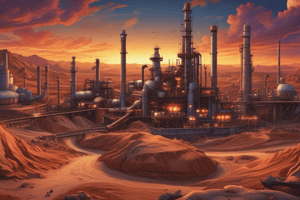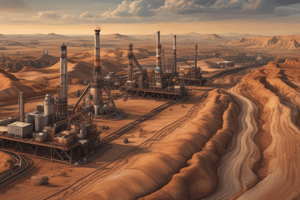Podcast
Questions and Answers
What is the main difference between the layers of petroleum oil and gas, and water?
What is the main difference between the layers of petroleum oil and gas, and water?
- Petroleum oil and gas are heavier than water
- Petroleum oil and gas are lighter than water (correct)
- Petroleum oil and gas have the same density as water
- Petroleum oil and gas do not exist in the same location as water
What is the primary use of petrol?
What is the primary use of petrol?
- Running light automobiles such as motor cycles/scooters and cars (correct)
- Generating electricity
- Running heavy motor vehicles
- Refining of petroleum
What is the source of petroleum?
What is the source of petroleum?
- Organisms living in the sea (correct)
- Living organisms on land
- Dead plants and animals
- Rocks and minerals
What is the name of the process that separates various constituents of petroleum?
What is the name of the process that separates various constituents of petroleum?
What is the primary fuel used in heavy motor vehicles?
What is the primary fuel used in heavy motor vehicles?
Where was the world’s first oil well drilled?
Where was the world’s first oil well drilled?
What is the origin of the word 'petroleum'?
What is the origin of the word 'petroleum'?
What are the constituents of petroleum?
What are the constituents of petroleum?
Where was oil struck in India for the first time?
Where was oil struck in India for the first time?
What is the characteristic of petroleum?
What is the characteristic of petroleum?
Flashcards are hidden until you start studying
Study Notes
Petroleum and Natural Gas Deposits
- Petroleum and natural gas deposits are found between layers of rock, with the oil layer above the water layer due to its lower density.
- The process of separating the various constituents of petroleum is known as refining, which is carried out in a petroleum refinery.
Uses of Petroleum and Natural Gas
- Petroleum is used as a fuel in vehicles and provides various useful substances such as detergents, fibers (polyester, nylon, acrylic, etc.), polythene, and other man-made plastics.
- Natural gas is used for power generation and is stored under high pressure as compressed natural gas (CNG).
- Hydrogen gas obtained from natural gas is used in the production of fertilizers (urea).
Formation of Petroleum
- Petroleum was formed from the dead remains of organisms living in the sea, which settled at the bottom of the sea and got covered with layers of sand and clay over millions of years.
- The process of formation of petroleum involved the absence of air, high temperature, and high pressure.
Natural Gas
- Natural gas is a very important fossil fuel due to its ease of transportation through pipes.
- CNG is used for power generation and is a cleaner fuel.
Fossil Fuels
- Fossil fuels, including coal, petroleum, and natural gas, are exhaustible resources formed from the dead remains of living organisms millions of years ago.
- It is essential to use fossil fuels judiciously due to their limited resources.
Studying That Suits You
Use AI to generate personalized quizzes and flashcards to suit your learning preferences.




